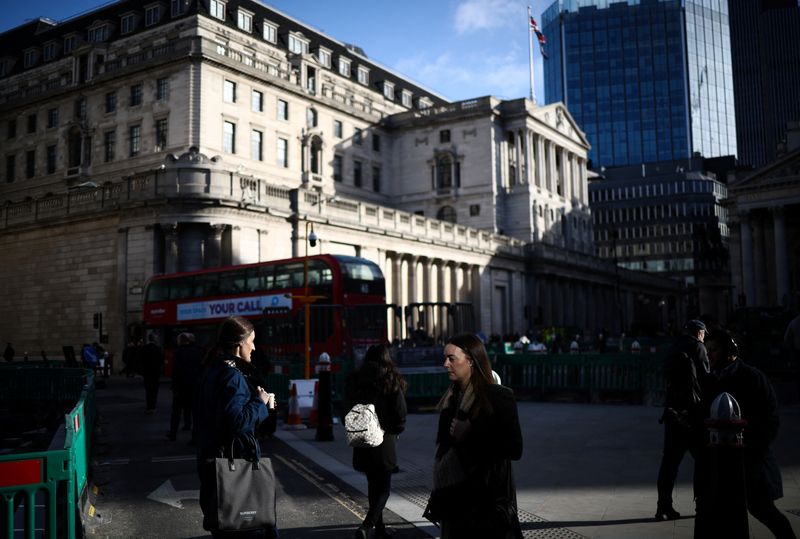By William Schomberg and David Milliken
LONDON, March 23 (Reuters) - The Bank of England raised interest rates by a further quarter of a percentage point on Thursday and said it expects the surge in British inflation to cool faster than before, despite a surprise jump in price growth announced on Wednesday.
Sounding more upbeat about the outlook for the country's slow pace of economic growth, the BoE's nine rate-setters voted 7-2 in favour of a 25 basis-point increase in Bank Rate to 4.25%.
That was its 11th consecutive increase in borrowing costs which began in December 2021, although it was the smallest rise since June last year.
Monetary Policy Committee members Swati Dhingra and Silvana Tenreyro voted to keep rates on hold while Catherine Mann, who has been the committee's strongest advocate for raising rates in bigger steps, backed the relatively small 25 basis-point increase.
The BoE - which is trying to reconcile a weak economic outlook and anxieties about global banks with stubbornly high inflation - kept unchanged its message that its MPC saw less urgency about maintaining its fast run of rate hikes.
"The MPC will continue to monitor closely indications of persistent inflationary pressures, including the tightness of labour market conditions and the behaviour of wage growth and services inflation," the BoE said.
"If there were to be evidence of more persistent pressures, then further tightening of monetary policy would be required," it added.
BoE Governor Andrew Bailey and his colleagues last month dropped language saying that they were ready to act forcefully if the outlook suggested persistent inflationary pressures.
In Thursday's statement, the BoE said price growth remained on course to fall sharply in the April-June period of this year, despite inflation's surprise jump to 10.4% in February.
Inflation in the second quarter would be lower than the BoE forecast last month after finance minister Jeremy Hunt last week announced an extension of state subsidies to lower households' utility bills, and international energy prices fell, it said.
As recently as Tuesday - before the latest inflation data - investors were split 50-50 on whether the BoE would leave Bank Rate unchanged for the first time since November 2021 after the rescue of Credit Suisse (SIX:CSGN) and the collapse of Silicon Valley Bank.
The BoE on Thursday noted "large and volatile moves" in financial markets around the world caused by the banking turmoil but said its Financial Policy Committee judged that Britain's banking system remained resilient.
"The MPC will continue to monitor closely any effect on the credit conditions faced by households and businesses, and hence the impact on the macroeconomic and inflation outlook," it said.
The European Central Bank last week stuck to its plans and raised rates by 50 basis points despite the Credit Suisse turmoil, a move repeated by the Swiss National Bank on Thursday as it warned that more hikes could not be ruled out.
On Wednesday, the U.S. Federal Reserve raised its main interest rates by a quarter of a percentage point, and indicated it was on the verge of pausing further increases.
The BoE predicted measures included in Hunt's budget would speed up Britain's sluggish economy and increase the level of gross domestic product by about 0.3% over the coming years.
It said it expected GDP would grow slightly in the second quarter of 2023, an upgrade of its pre-budget forecasts made in February that the economy was on course to shrink by 0.4% during the April-June period.
As well as the extended energy subsidies to households - which had originally been due to expire in April - the BoE now expects employment growth to be stronger than previously forecast.
The BoE is worried about the strength of the labour market because pay growth, despite cooling a bit recently, is running far above its historical average and shortages of workers remain acute, all of which is inflationary.
However, it said it expected wages to rise slightly less than it had previously forecast, as inflation expectations fell.
The BoE was not due to hold a quarterly news conference by Bailey and other top officials on Thursday. Bailey is due to make a speech on Monday.
The BoE was the first major central bank to start raising rates in December 2021 and until this week had seemed likely to join the Bank of Canada which this month stopped raising borrowing costs.
Earlier on Thursday, before the rate decision, investors in rate futures markets were positioned for possibly two more 25-basis-point moves by the BoE by September after Thursday's expected hike.
